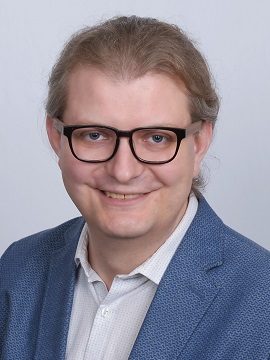Luke Bergmann
Research Area
Education
University of Minnesota, 2012, PhD
University of Minnesota, MA
Duke University, BS
About
Canada Research Chair in GIS, Geospatial Big Data and Digital Geohumanities
Teaching
Publications
2024
Chaves, L.F. Friberg, M. D. Pascual, M. Calzada, J. E. Luckhart, S. and L.R. Bergmann. 2024. Community-serving research addressing climate change impacts on vector-borne diseases. The Lancet Planetary Health 8: e334–41.
O’Sullivan, D. and L. Bergmann. 2024. Space: towards a global sense of place. In A Research Agenda for Spatial Analysis, edited by Wolf, L.J. Heppenstall, A. and R.A Harris, 39-54. United Kingdom: Edward Elgar Books.
2023
Michaux, M. Chan, J. M. Bergmann, L. Chaves, L. F. Klinkenberg, B. and K. Jacobson. 2023. Spatial Cluster Mapping and Environmental Modeling in Pediatric Inflammatory Bowel Disease. World Journal of Gastroenterology 29 (23): 3688-3702. doi: http://dx.doi.org/10.3748/wjg.v29.i23.3688
Rhodes, C.G. Chaves, L. F. Bergmann, L. R. and G. L. Hamer. 2023. Ensemble species distribution modeling of Culex tarsalis (Diptera: Culicidae) in the Continental United States. Journal of Medical Entomology 60 (4): 664–679. doi: https://doi.org/10.1093/jme/tjad027
Bergmann, L. Chaves, L. F. O’Sullivan, D. and R. G. Wallace. 2023. Dominant Modes of Agricultural Production Helped Structure Initial COVID-19 Spread in the US Midwest. ISPRS International Journal of Geo-Information 12 (5): 195.
Rhodes, C. G. Chaves, L. F. Bergmann, L., and G. L. Hamer. 2023. Ensemble species distribution of Culex tarsalis (Diptera: Culicidae) in the continental United States. Journal of Medical Entomology. doi: https://doi.org/10.1093/jme/tjad027
Chaves, L. F. Rigg, C. A. Friberg, M. D. Perea, M. Hurtado, L. A. Gottdenker, N. L. and L. Bergmann. 2023. Five Common Myths About Land Use Change and Infectious Disease Emergence. In Earth Data Analytics for Planetary Health, edited by T. H. Wen, T. W. Chuang, and M. , 109-119. Taipei: Springer.
2022
Bergmann, L. Chaves, L. F. Betz, C. R. Stein, S. Wiedenfeld, B. Wolf, A. and R.G. Wallace. 2022. Mapping Agricultural Lands: From Conventional to Regenerative. Land 11 (3): 437-441. doi: https://doi.org/10.3390/land11030437
Chaves, L.F. Friberg, M. D. Hurtado, L. A. Rodríguez, R. M. O’Sullivan, D. and L.R. Bergmann. 2022. Trade, uneven development and people in motion: Used territories and the initial spread of COVID-19 in Mesoamerica and the Caribbean. Socio-economic planning sciences 80. doi: 10.1016/j.seps.2021.101161
Rhodes, C. G. Loaiza, J. R. Romero, L. M. Gutiérrez Alvarado, J. M. Delgado, Rojas Salas, O. Ramírez Rojas, M. Aguilar-Avendaño, C. Maynes, E. Valerín Cordero, J. A. Soto Mora, A. Rigg, C. A. Zardkoohi, A. Prado, M. Friberg, M. D. Bergmann, L. Rodríguez, R. M. Hamer, G. L. and L. F. Chaves. 2022. Anopheles albimanus (Diptera: Culicidae) Ensemble Distribution Modeling: Applications for Malaria Elimination. Insects 13 (3): 221. doi: https://doi.org/10.3390/insects13030221
Barnes, T.J., and L. Bergmann. 2022. The early years: William Bunge and Theoretical Geography. In Recalibrating the Quantitative Revolution in Geography: Travels, Networks, Translation, edited by Michel, B., F. Gyuris, and K. Paulus, 180-193. London: Routledge.
2021
Wallace, R. G. Liebman, A. Weisberger, D. Jonas, T. Bergmann, L. Kock, R. and R. Wallace. 2021. Industrial agricultural environments. In Routledge Handbook of Biosecurity and Invasive Species, edited by K. Barker, and R. A. Francis, 194-214. London: Routledge.
Bergmann, L. and N. Lally. 2021. Enfolding: an experimental geographical imagination system (gis). In A Place More Void, edited by Kingsbury and A. J. Secor, 167-180. University of Nebraska Press.
2020
Bergmann, L. and N. Lallu. 2020. For geographical imagination systems. Annals of the American Association of Geographers 111(1): 26-35. doi: https://doi.org/10.1080/24694452.2020.1750941
Song, Z. Wang, C. and L. Bergmann. 2020. China’s prefectural digital divide: Spatial analysis and multivariate determinants of ICT diffusion. International Journal of Information Management 52 . doi: https://doi.org/10.1016/j.ijinfomgt.2020.102072
Additional Description
What kind of computation for what kind of geography? This question animates many of my inquiries into economic geography, nature-society relations, globalization, China, and sociospatial theory.
